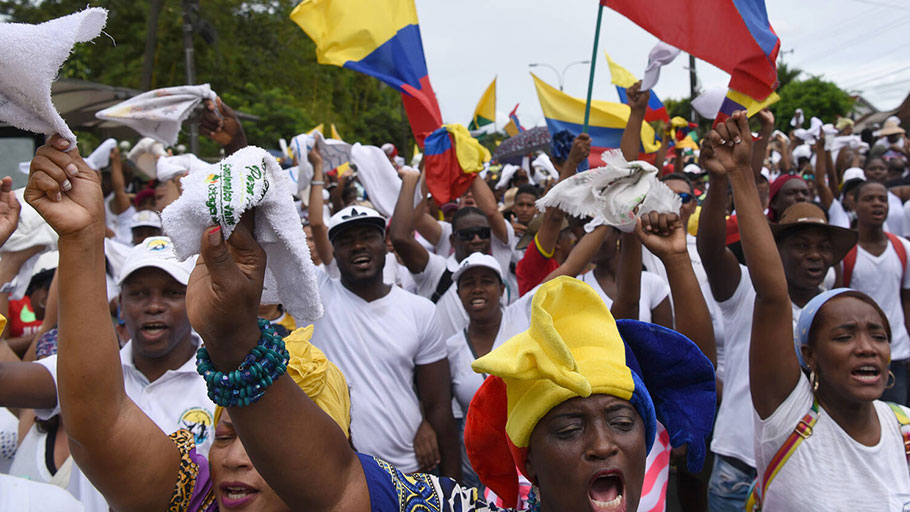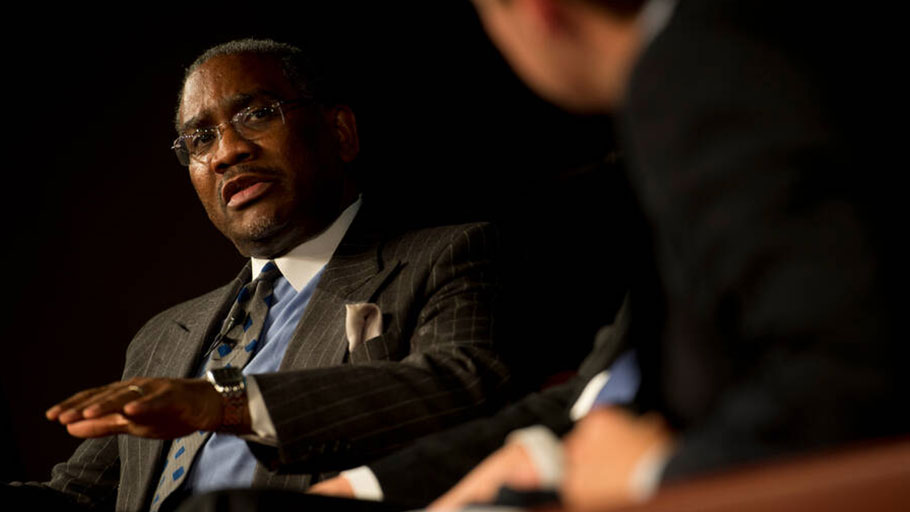Rep. Gregory Meeks worked with Colombian politicians tied to right-wing paramilitaries to help push for a corporate-friendly “free trade” deal.
By Sarah Lazare and Maurizio Guerrero, In These Times —
Rep. Gregory Meeks (D‑N.Y.), the establishment favorite to replace outgoing Rep. Eliot Engel (D‑N.Y.) as chair of the powerful House Foreign Affairs Committee, is known for his fierce support of “free trade” deals around the world. He didn’t just vote in favor of agreements like the Central America Free Trade Agreement or the proposed Trans-Pacific Partnership, but actively lobbied for them, and has spoken repeatedly and consistently about the merits of such deals, even when it involved siding with Republicans against the majority of Democrats.
This track record has earned Meeks the ire of labor and environmental groups, which oppose such agreements on the grounds that they worsen corporate exploitation and strengthen the power of multinationals to undermine domestic protections, from union rights to pollution regulations. “Meeks is the worst on trade issues and has voted for corporate power and against the Democratic majority, against labor, against consumer and environmental groups’ positions, etc. on every trade vote since he has been in Congress,” Lori Wallach, the director of Public Citizen’s Global Trade Watch, which monitors corporate abuse, tells In These Times. Critics worry that as head of the House Foreign Affairs Committee, which has broad jurisdiction over bills and oversight related to foreign policy and security assistance, Meeks would be positioned to further entrench this trade agenda.
With Democrats maintaining their majority in the House on November 3 (although losing some seats), these tensions could erupt into an intra-party battle over the Democratic position on issues of “free trade.”
But it is activists working with marginalized groups in Colombia, many of them Afro-Colombians themselves, who hold a special resentment toward Meeks — and fear of the Colombian figures he collaborated with to push through the Colombia Free Trade Agreement (FTA), a “free trade” law passed in 2011, after years of tension between big business and a bloc of labor, environmental and rights organizations. Meeks distinguished himself not only by being one of the Democratic Party’s most gung-ho supporters of this deal, but by collaborating closely with conservative then-President of Colombia Álvaro Uribe, who oversaw surveillance, sabotage and extrajudicial executions of journalists, union leaders and Afro-Colombian rights defenders. Through his work with the Uribe government to pass the Colombia FTA, Meeks formed a relationship with politician Edgar Ulises Torres, who was later jailed for receiving money from Freddy Rendón (known as “el Alemán”) — the brutal leader of the Elmer Cárdenas Bloc of the far-right paramilitary group, United Self-Defenses of Colombia (AUC).
Some activists who work with social movements in Colombia and have direct knowledge of these Colombian para-politicians were reluctant to speak freely over concerns that they would endanger their own lives or the lives of their associates.
Unwavering support for the Colombia FTA
The Colombia FTA was signed in 2006 under the administration of President George W. Bush, but wasn’t formally approved by Congress until 2011 — at the urging of then-President Barack Obama. The delay was due to concerns about the dismal treatment of labor activists in Colombia, including the murder of 528 unionists during the eight years of Uribe’s two-term presidency, making Colombia one of the most dangerous countries in the world for union activists. The agreement passed over the broad opposition of Afro-Colombian social movement organizations, including Process of Black Communities in Colombia (PCN), which warned at the time that the deal would enable predatory development projects that lead to further displacement, expropriation and food insecurity for Afro-Colombian communities.
“Meeks’ work has sadly been stained by his relationships with politicians linked to paramilitaries, like Edgar Ulises and Odín Sánchez, who were associated with the growth of paramilitaries in the department of Chocó.” —Danilo Rueda, Colombian rights defender
Since it was implemented in May 2012, the FTA — which will phase out all consumer and industrial tariffs by 2021 — has failed to stop assassinations of labor leaders, despite the Colombian government’s stated commitment to improving workers’ rights. Between January of 2016 and April of 2019, 681 social activists and rights defenders were murdered, and between 2016 and 2018, at least 70 unionists executed. As mega-development and port expansion projects have surged, Afro-Colombian communities have remained mired in extreme poverty, hyper-exploitation and displacement — conditions that prompted a general strike in the Colombian city of Buenaventura in 2017.
Meeks was a crucial supporter of the Colombia FTA. In 2009, he co-founded the Colombia Caucus, which aimed to “strengthen political, economic and security ties” between the United States and Colombia. In 2011, ahead of the congressional vote, that caucus urged swift passage of the deal. “The longer we wait to pass the FTA, the more market share U.S. businesses lose to foreign competitors and the fewer jobs we create at home,” read a Colombia Caucus statement released from Meeks’ office at the time. But that wasn’t Meeks’ only institutional role in pushing the Colombia FTA. He was also involved in the work of the International Republican Institute (IRI), mostly a Republican Party-affiliated body, to promote the trade deal to the Congressional Black Caucus. And he would emerge as a key point of contact between U.S. Congress and members and allies of the Uribe government.
Former President Álvaro Uribe
Meeks did not hide his loyalties. As early as 2005, advertising his own visit to Colombia, Meeks lauded Uribe for supporting “phase II of Plan Pacifico, which concentrates investment on Colombia’s Pacific Coast, an area that is heavily inhabited by African-Colombian communities.” (This plan was opposed by social movements because it allowed transnational companies to benefit from environmentally destructive, large-scale infrastructure projects on Afro-Colombian and Indigenous lands.)
At a 2007 hearing before the the House Committee on Foreign Affairs, Meeks sought to downplay worries about human rights abuses under Uribe, including concerns that the Colombian president’s former intelligence chief was being prosecuted at the time for handing over the names of union leaders to paramilitary groups (those union leaders were later killed). Meeks insisted, “You cannot wipe it out in just a matter of a few years, but if you also ask is there a President who is intent on making sure that the lives of his people are better? The answer has to be yes.”
In 2007, Meeks appeared at an event with the Colombian diaspora in New York alongside Uribe, who introduced Meeks by saying that “he goes into the poorest regions and stays in the community.” Meeks proclaimed in response, “President Uribe is one of the best allies we’ve ever had. He’s cooperated with the United States government with reference to the illegal drug trade, he’s cooperated with the United States of America particularly after 9⁄11, and now it is time for us as the United States to cooperate with him with this free trade agreement.”
For many Colombians, Uribe was not an ally. His intelligence agency spied on, sabotaged, and threatened the lives of journalists, human rights defenders, political candidates and judges, according to a report released by the Washington Office on Latin America and other research and advocacy organizations. In a “parapolitics” scandal that started in 2006, more than 60 politicians and lawmakers, a number of whom were associated with Uribe, were indicted for ties to right-wing paramilitary death squads, including eventually Uribe’s own cousin and close associate, Mario Uribe. Álvaro Uribe was in power during the “false positives” scandal, in which the Colombian military killed thousands of civilians, claimed they were armed guerrillas, and counted them as combat fatalities. During his presidency, Uribe was already marked by allegations of ties with the AUC, the right-wing paramilitary coalition responsible for “the largest number of human rights abuses in the conflict, including kidnapping, extortion, murder, and rape,” according to a report from the the Council on Hemispheric Affairs, a nonprofit research organization. Even a high-level Pentagon official acknowledged Uribe’s likely paramilitary ties, a U.S. cable shows.
Father Sterlin Londoño is a human rights defender who works as a Catholic priest in the department of Chocó, an area populated heavily by Afro-descendants and Indigenous people. He also serves as political advisor to the Greater Community Council of the Popular Peasant Organization of Alto Atrato, which is made up of 45 Afro-Colombian communities. Londoño tells In These Times that during Uribe’s presidency, the cultivation of the African palm was consolidated as a national industry with the help of the paramilitary squads in the Chocó, in charge of displacing people from their territories. “At that time we saw the most significant forced displacements in the ethnic territories,” he says.
In late 2007, concerned about Afro-Colombian opposition to the FTA, Uribe established the “Commission for the Advancement of Afro-Colombian People.” According to the U.S.-based advocacy organization Public Citizen, “The Commission was stacked with Uribe supporters and individuals known to support the FTA.” Uribe then used that Commission to make the case that the FTA had Afro-Colombian support, a tactic also used by President George W. Bush and Meeks. This was one of many efforts to undermine Afro-Colombians’ “hard-won civil rights and our control of our territories,” wrote Marino Cordoba, founder of the Association for Afro-Colombian Internally Displaced Persons — a nonprofit advocating for internally displaced Afro-Colombians — in a 2008 op-ed, noting that local grassroots leaders firmly opposed the Commission.
Londoño agrees with Cordoba. “There’s people that are not the spokespersons of the Afro-Colombian community,” he says. “The spokespersons of these communities are the ethnic leaders on the ground, but Meeks does not acknowledge this reality.”
Relationships with para-politicians
But Uribe was not Meeks’ only political relationship in Colombia. In 2005, Meeks’ office advertised a meeting with “Afro-Colombian leadership,” including the second Vice President of Colombia’s House of Representatives, Edgar Ulises Torres, a Congressman for the Chocó department since 1994. This is the same Torres who was convicted in July 2011 of aggravated conspiracy, after a roughly two-year investigation into paramilitary leader Freddy Rendón determined the Congressman was a member of his group of political associates. Rendón claimed that Torres accepted significant campaign funds in 2001 and 2002. According to the investigative news outlet VerdadAbierta.com, Rendón’s men “killed and displaced hundreds of indigenous people and Afro-Colombians who refused to sell their lands for palm cultivation.”
Torres was so close to Meeks — who by 2007 had traveled on several occasions to Colombia, according to President Uribe — that the U.S. congressman invited Torres to President Barack Obama’s inauguration in January 2009, according to at least two media reports. The trip was apparently financed by the paramilitary leader Rendón, who testified that he gave Torres $10,000 for a trip to the United States that investigators believe was used to attend Obama’s inauguration. El Economista reported in 2009 that Torres did in fact attend the inauguration.

A protest during the sixth day of a general strike in Buenaventura, Colombia on May 21, 2017. (Christian Escobar Mora, AFP via Getty Images).
By then, Meeks had become the key contact point for Colombia’s Afro-Colombian Congressional Caucus, which began receiving financial support from USAID in 2006, distributed by IRI and the National Democratic Institute. By 2009, at least five of the 10 legislators that received this U.S. support were either investigated or in jail for ties to paramilitary organizations and/or drug traffickers. A State Department cable published by Wikileaks indicates that the members of this caucus viewed Meeks as a close ally. The cable states that members of the caucus had expressed concern that, in the wake of investigations for wrongdoing, USAID’s public support was waning (although financial aid had continued). “In the last meeting between USAID Mission Director and three of the Caucus members on May 27, the members complained about the lack of support and threatened to complain to Congressman Gregory Meeks,” the cable says.
In addition to Torres, another member of this U.S.-backed Afro-Colombian caucus was Odín Sánchez, who served as a member of the local Council of Quidbó, in Chocó, starting in 1992 and then, in 1998, was elected to the national Congress. Sánchez formed part of the delegation that traveled with Uribe to Washington, D.C. in 2007 to, among other activities, meet with the Congressional Black Caucus. And in 2008, IRI advertised it had hosted “three members in Washington, D.C. for a series of trainings and meetings with the U.S. Congressional Black Caucus” — Sánchez among them. In 2011, Sánchez was convicted alongside Torres of “promoting illegal armed groups” — namely, the AUC.
Danilo Rueda, a Colombian human rights defender leading the Comisión Intereclesial de Justicia y Paz, a nonprofit advocating for community rights in Colombia, tells In These Times, “Meeks’ work has sadly been stained by his relationships with politicians linked to paramilitaries, like Edgar Ulises Torres and Odín Sánchez, who were associated with the growth of paramilitaries in the department of Chocó.”
It is impossible to know whether Meeks was aware of the dealings of Torres and Sánchez with right-wing paramilitaries, and Meeks’ office did not return a request for comment. But it was well-known among Afro-Colombians that these politicians belonged to “political clans” in a department where right-wing militias’ activities were rampant. “Politics in the department of Chocó has been marked by fire by the presence of political clans,” according to a report by Fundación Paz y Reconciliación, a think tank working on post-conflict issues in Colombia. Those clans “are characterized by their direct or indirect relationship with armed groups and illegal economies.” Two of these “political clans” were headed by Torres and Sánchez.
“When I went to congressional offices, the first question was, ‘Where is Gregory Meeks on this?’ People didn’t want to step on his toes, because the Afro-Colombian issue was seen as his issue.” —Charo Mina-Rojas, member of Process of Black Communities in Colombia
As legislators, Sánchez and Torres opposed the codification of the Law 70 that recognizes the collective ownership of the land of Afro-Colombian communities that have historically inhabited a territory. “They were openly opposed to the interests of the Black communities despite calling themselves part of the Afro-Colombian Congressional Caucus,” says Londoño.
According to Rueda, “It was known that these clans were seriously questioned by the Black communities on the ground.” He adds that these clans promoted their own political projects “which were not launched for the common good, but for their personal interests.”
Criticism of Meeks
Anthony Dest worked for the Washington Office on Latin America, a research and advocacy group, from 2010 to 2012, and is currently an assistant professor of anthropology at Lehman College. He tells In These Times that Meeks “blocked a lot of the momentum coming from Colombian social movements and solidarity groups in the United States. He claimed to represent the interests of Afro-Colombians, while simultaneously shutting out Black social movements opposed to the FTA.”
Charo Mina-Rojas, a Colombia-based member of PCN, has a similar recollection. She tells In These Times, “It was very problematic that he [Meeks] was bringing people to the United States to promote the FTA while we were at the same time trying to inform members of Congress that it was not a great idea.”
Mina-Rojas was involved in efforts in Washington, D.C. to lobby against the FTA. “When I went to congressional offices, the first question was, ‘Where is Gregory Meeks on this?’ People didn’t want to step on his toes, because the Afro-Colombian issue was seen as his issue.”
To this day, Meeks continues to highlight his connection to Colombian politics — and speak as an authority on Afro-Colombian issues, earning him resentment from solidarity activists who remember his actions in pushing for the Colombia FTA. But, overall, Meeks’ collaboration with the Uribe government has brought few negative political consequences for him and, in fact, seems to have only boosted his profile. In early September he was a featured speaker at a Joe Biden-Kamala Harris event to “share the vision of the Biden/Harris Administration on the Afro-Colombian community in the United States and in Colombia.”
Meeks’ reputation as the most business-friendly Congressional Democrat from New York, meanwhile, does not go unnoticed by the corporate PAC world. Of the 21 House Democrats representing New York State, Meeks draws the greatest percentage of business PAC support and the lowest percentage of labor support. In the 2020 election cycle, 88% of Meeks’ PAC money was categorized by Open Secrets as business PAC money, and only 8% was from labor PACs. By contrast, the average New York Congressional Democrat receives 24% labor support, three times what Meeks hauls (Rep. Alexandria Ocasio-Cortez receives 67% labor PAC support and 0% from business PACs). Meeks’ top five donors are from private equity firm KKR & Co., hedge fund management company Blackstone Group, New York Life Insurance, Nasdaq, Inc and Rock Holdings, parent company of mortgage giant Quicken Loans.
In summer 2009, a busy time for those advocating for the Colombia FTA, Meeks held a high-dollar fundraiser at the Washington, D.C. office of Glover Park Group, a lobbying firm hired at the time by the Colombia government to win over skeptical Democrats in Congress. The Foreign Agents Registration Act form filed by Glover Park Group disclosed that the firm was tasked with “establishing communications with policymakers, as well as monitoring and reporting on legislation and executive branch activities which may affect the development and passage of the Trade Promotion Agreement between the United States and the Republic of Colombia.”
“Those trade deals, because of how extensive they are, corporate interests really, really like them,” Dan Mauer, director of government affairs for the labor union Communications Workers of America, tells In These Times. “They can get a lot of things done they can’t through our domestic processes. There is a lot to be gained from being a cheerleader for those deals. You get a lot of corporate support if you support the corporate trade agenda politically.”
These criticisms could be brought to the fore in the contest to chair the House Foreign Affairs Committee, with Brad Sherman (D‑Calif.) and Joaquin Castro (D‑Tex.) also in the running. So far, Castro has received the bulk of support from progressive groups, which view the representative as the most dovish option on foreign policy. Those who remember Meeks’ history in Colombia worry that, at the helm of the House Foreign Affairs Committee, the New York representative would be positioned to pursue similar right-wing political collaborations and “free trade” policies around the world.
“He turned a blind eye to horrible human rights violations under Uribe,” says Mina-Rojas. “I don’t see how that will be different now.”
Source: In These Times
Featured image: U.S. Congressman Gregory Meeks pictured in Berlin on November 25, 2013. Photo by John Macdougall, AFP via Getty Images.















